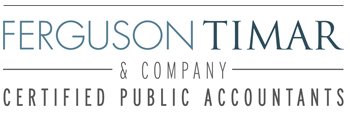
Investing in life insurance ensures loved ones are provided for in the event of an individual’s death. Yet, if one’s approach to life insurance is not handled in specific ways, much of what should be passed on to dependents and beneficiaries may be lost to taxes.
In this article, the forward-thinking CPAs at Ferguson Timar discuss the task of minimizing tax liability as it pertains to life insurance benefits. If you are concerned about leaving enough resources behind so your loved ones won’t have to worry about financial matters when you’re gone, this subject may be of particular interest to you.
Considering a Beneficiary’s Tax Burdens
Inheriting assets from a deceased individual’s estate is usually a positive financial development for someone who is likely grieving a great loss. Yet, the tax burdens associated with the gift of assets from an estate are sometimes so cumbersome they can either significantly devalue or even nullify the value of the gift the deceased hoped to bestow.
This is the primary reason why tax-focused estate planning is such a consequential undertaking. Not only can a proactive approach ensure someone’s hard-earned or well-preserved assets pass to the next generation, this effort can ensure a grieving beneficiary is not overwhelmed by tax liability tied to the gifts they are set to receive.
How Are Life Insurance Benefits Taxed?
A beneficiary may or may not be burdened with tax liability tied to a life insurance policy payout, depending on the terms of the policy and how the policy is treated either during the policyholder’s life or in the aftermath of the policyholder’s death. Regardless, this liability does not stem from classification of the asset as taxable gross income. Instead, alternative tax burdens may arise circumstantially.
For example, if a policyholder doesn’t green light the immediate payout of benefits, a beneficiary may be held responsible for taxes on the interest generated by the policy for as long as it is held by the governing life insurance company. As a result, many policyholders either make payouts transferable immediately upon their death, or they transfer the ownership of a policy to a beneficiary before their death.
If an Estate, Not an Individual, Is a Beneficiary
Someone may opt to name their broader estate as a beneficiary of a life insurance policy instead of an individual or set of individuals for several reasons. Most notably, someone may want this asset to cover the costs associated with their remaining debts, funeral expenses, and court costs, so these burdens don’t diminish the value of their other assets. However, naming an estate as the beneficiary of a life insurance policy comes with a cost.
Once an estate receives the benefits of a life insurance policy, any beneficiary who is ultimately gifted a portion of that asset may be required to pay estate taxes on it. This is not a burden they would contend with if they were named the policy’s beneficiary directly, or they had assumed ownership of the policy before the original policyholder’s death.
Also, selecting “payable to my estate” as the beneficiary of a life insurance policy increases the overall value of the estate itself. This increase in value can result in a significant estate tax burden that can be avoided if ownership of the payout is transferred to another individual or entity before the policyholder’s death. A notable exception to this rule goes into effect if the policyholder dies within three years of an ownership change. Under these circumstances, the policy payout is treated as if the value has been gifted to the deceased’s estate and taxed accordingly.
Ferguson Timar Can Minimize Your Estate-Related Tax Liability
The most straightforward ways to ensure life insurance benefits are not taxed is to name at least one individual–not one’s estate–as a beneficiary and elect for an immediate payout or an ownership transfer. Alternatively, creating an irrevocable life insurance trust can insulate this asset from taxation. However, an individual’s financial circumstances may render one or both of these decisions more complicated than they appear to be at first glance.
If you have concerns about minimizing your estate-related tax liability, the creative CPAs at Ferguson Timar can assist you with achieving this consequential goal. Contact our team today at (714) 204-0100 to discuss how to minimize your estate’s tax-related liability, so you can leave more of what’s yours to those about whom you care. We look forward to speaking with you.
